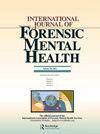Cross-Cultural Violence Risk Assessment: Adapting the HCR-20V3 for Incarcerated Offenders in Mexico
IF 0.9
4区 医学
Q3 CRIMINOLOGY & PENOLOGY
International Journal of Forensic Mental Health
Pub Date : 2022-03-31
DOI:10.1080/14999013.2022.2053000
引用次数: 2
Abstract
Abstract This prospective study investigated the predictive validity of a culturally adapted version of the Historical-Clinical-Risk Management-20 (HCR-20V3) with a sample of 114 incarcerated males in a medium-security prison in Mexico City. The goal was to integrate a culturally responsive approach to violence risk assessment by incorporating culturally relevant risk factors identified by forensic mental health professionals in Latin America who conduct violence risk assessments. These risk factors related to problematic family and peer relationships, machismo, normalization of violence, and economic disadvantage. Data collection for HCR-20V3 ratings involved clinical interviews and a review of institutional documents; data on aggressive incidents were collected through document review, self-report follow-up interviews, and guard reports. Participants who engaged in institutional violence during the 3-month follow-up period were given significantly higher scores on several culturally relevant risk factors than those who did not engage in institutional violence. Although the culturally adapted HCR-20V3 items did not provide incremental validity to the original HCR-20V3 items, the culturally adapted HCR-20V3 total score produced an area under the ROC curve of .73-.74. The findings provide evidence that the culturally adapted HCR-20V3 has strong predictive validity and the utility of adapting culturally relevant risk factors for the assessment of violence risk.跨文化暴力风险评估:墨西哥被监禁罪犯适用HCR-20V3
摘要:本前瞻性研究调查了历史-临床-风险管理-20 (HCR-20V3)文化适应性版本的预测有效性,样本为114名在墨西哥城中等安全监狱服刑的男性。目标是通过纳入拉丁美洲进行暴力风险评估的法医心理健康专业人员确定的与文化相关的风险因素,将一种符合文化特点的方法纳入暴力风险评估。这些风险因素与有问题的家庭和同伴关系、大男子主义、暴力正常化和经济劣势有关。HCR-20V3评分的数据收集包括临床访谈和机构文件的审查;攻击性事件的数据通过文件审查、自我报告随访访谈和警卫报告收集。在三个月的随访期间,参与机构暴力的参与者在几个与文化相关的风险因素上的得分明显高于没有参与机构暴力的参与者。虽然文化适应后的HCR-20V3量表的效度并没有比原HCR-20V3量表的效度增加,但文化适应后的HCR-20V3总分在ROC曲线下产生了0.73 - 0.74的面积。研究结果证明,适应文化的HCR-20V3具有很强的预测有效性,并且适应文化相关风险因素对暴力风险评估具有实用性。
本文章由计算机程序翻译,如有差异,请以英文原文为准。
求助全文
约1分钟内获得全文
求助全文

 求助内容:
求助内容: 应助结果提醒方式:
应助结果提醒方式:


